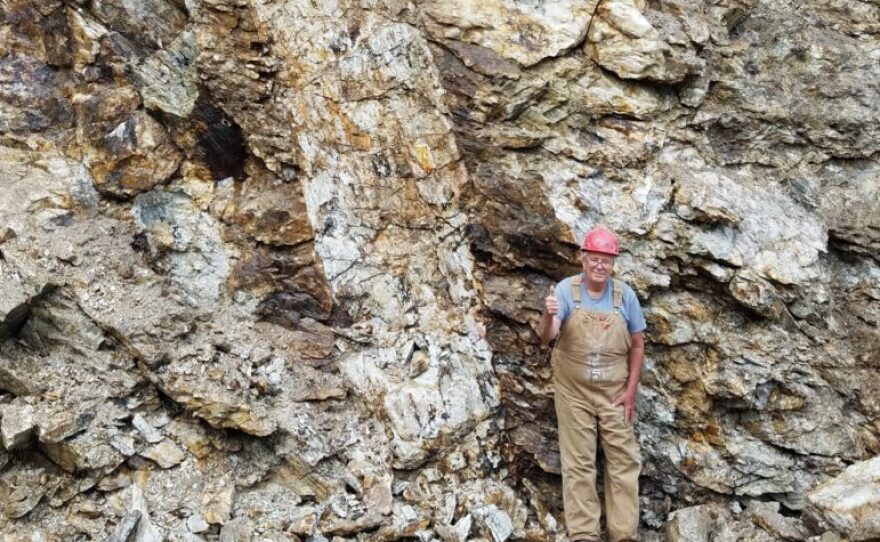State lawmakers are considering relaxing aspects of Maine's stringent mining laws in response to the discovery of a potentially massive deposit of lithium in western Maine. But first they will have to resolve a debate about what level of changes, if any, are needed to allow mining for a metal that's in high demand.
Ever since the lithium on their land made headlines about a year and a half ago, Mary Freeman said she and her husband, Gary, have heard "rather astounding" comments about the deposits. The value of the deposit in what’s known as spodumene minerals has been pegged at more than $1 billion and has been described by geologists as being among the richest such deposits in the world. But Freeman told lawmakers last week that their initial exploratory pit on their Newry land is less than an acre in size.
“With that much work done, it's very difficult to say how big, how deep, how vast this deposit is,” Freeman said. “What I can say is that crystals like this are very low in iron and they have a higher percentage of lithium oxide, which makes them valuable as technical-grade spodumene.”
Freeman told lawmakers reviewing a slew of mining related bills inspired by their discovery that the crystals on Plumbago Mountain are rare and contain the high-grade lithium that's used to make so-called "scientific glass" such as cellphone and computer screens that won't crack when exposed to higher heat or cold.
"It probably would not be used in electric vehicles because it is needed for special situations where purity is important ... but it's capable of that should someone want to do that,” Freeman said. “The purity and the size of the crystals are what make it unique."
Lithium is a rare-earth material that is in high demand for cellphone screens and the increasingly efficient batteries that allow some electric vehicles to go hundreds of miles on a single charge. The Freemans want to mine their lithium. But they've been locked in a regulatory battle with the Maine Department of Environmental Protection for nearly a year over what rules would govern their operation.
"Now that lithium and so-called rare earth materials are in high demand for renewable energy technology and other uses, and deposits of those metals are being found in Maine, we are faced with the question of balancing the fight against climate change with protection of groundwater and natural resources in our backyards,” said Melanie Loyzim, commissioner of the DEP.
Last year, the DEP ruled that the Freemans would have to abide by metallic mining rules that are among the most stringent in the nation. Lawmakers approved the rules six years ago — as several developers began eyeing deposits of silver, gold, zinc and other metals in Maine — because mining for such materials often results in a highly acidic and toxic runoff that can foul lakes, streams and groundwater.
Now the DEP is proposing amending the law in a way that Loyzim said would likely allow the Freemans to operate a larger open pit mine at their specific location as long as they can show it won't result in pollution.
"I think the question at hand is, based on the way that lithium can be found in the state of Maine, how should it be regulated,” Loyzim said. “So our recommendation is that it should not be categorically exempted from the mining act."
But the Freemans pointed out that their lithium deposits are not in the type of sulfide rocks that create acid mine drainage and other toxic runoff like those that surround gold and silver. Instead, they said they should be governed by the same rules that apply to traditional rock and gravel quarries in Maine because the mining techniques and technology would be the same.
And they have the support of geologists like Jim Nizamoff of Hebron, who has studied such rock formations in Maine for decades. He said Maine has a long history of quarrying for granite and so-called pegmatite rocks that contain the type of large crystals that are being found on the Freeman property.
"And there are literally thousands of small quarries and prospect pits all throughout the state,” Nizamoff said. “They have been there since that time and they really don't have any of damage or environmental destruction."
The Freemans and Nizamoff want the Legislature to change the definition of "metallic mining" to exempt the type of rock-forming mineral deposits found on Plumbago Mountain. Lawmakers are also considering bills that would impose a moratorium on lithium mining as well as additional proposed changes to the metal mining law.
Several environmental or conservation organizations are urging lawmakers to proceed cautiously. Pete Didisheim with the Natural Resources Council of Maine said the world is "riddled with mining operations that have gone awry" and he said lawmakers shouldn't rush change to a law aimed at preventing such mining disasters in Maine.
And Sean Mahoney with the Conservation Law Foundation said he supports changing the mining law’s requirements around some open pit mines, including the one proposed in Newry, as long as the quarried rock will not cause pollution.
"It is a good law,” Mahoney said. “It is the most protective law in the country I would say when it comes to the impacts on natural resources of the state."
Lawmakers will hold a work session on the bills in the coming weeks.




